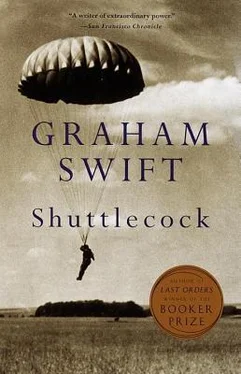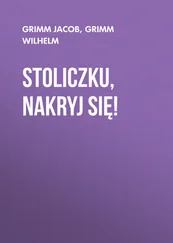As we drove, we had to pass, some of the way, along the Belfort road where bedraggled sections of German divisions were already retreating. There was irony here (not greatly felt at the time): an army in retreat and one, self-important staff-car determinedly conveying a single prisoner. The driver sounded his horn to clear a way through the lines of battered trucks, field-kitchens, commandeered wagons and lumbering men. The two officers in the front seat visibly stiffened and, doubtless for my benefit, put on an air of not acknowledging what was happening. I sat between two guards. I had been handcuffed but my feet were free. At every halt, junction and slow section of road, I had wild thoughts of knocking one of the guards aside, crashing through the locked car door and running for it. But I knew that even if I got free of the car, in twenty yards I would have as many bullets in my back.
I did not need to be told we were heading for the Château Martine. I thought to myself: when we get within a certain distance they will blindfold me. But I already had a mental picture (how well it was to serve me later) of the roads and the lie of the land around the Château and Combe-les-Dames. I had got to know the area with Mathieu at the time when that ambitious plan had been formed, then shelved, to organize a mass-escape of the Château’s prisoners. The Château Martine was where the SS now held ‘priority’ captives. Not ordinary Maquisards who had little to impart before being shot, but operators with special information and ‘intelligence value’. A British agent was for them a real prize. Before me lay the fate that every agent knows may await him and which he tries to push to the back of his mind. Capture, interrogation … execution.
I had nothing to give away which, in German hands, could possibly alter the course of the war. But I knew enough about the overall pattern of resistance activities, about resistance cooperation with the Allies and even about the specific tactical objectives of the British and Americans to lend a possible sting to the German retreat and claim unnecessary extra lives. I also knew the whereabouts of four other British agents. I could not make mathematical calculations on the importance of my information. I was unlike the general in the field who consciously estimates and anticipates so much loss of life, so much damage to equipment for the sake of an overall victory, and therefore wittingly yields so much to his enemy. The spy’s duty is to tell nothing, no matter how slight the strategic value of what he knows.
Sure enough, after we turned off the Belfort road, the blindfold came out. One of the officers said, in German and in English, ‘Can you see?’ And, to test the point, a pistol barrel struck me hard under the chin without warning.
I could tell we were climbing up into the hills, away from the river. The Château was only a matter of four kilometres away. It got cooler. I had dried out a good deal after my night in the water tank, but my clothes were still damp and I began to shiver. At the same time, with the blindfold on, the movement of the car round the hillside bends was making me nauseous. At length we took a turn and drove along a straight level stretch of road — the Château drive (between, as I remembered it, an avenue of chestnut trees). There was a crunching of gravel; the car wheeled and stopped. Barked orders and the noise of stamping boots. The officers in front and the guard on my left got out. Then the remaining guard, grasping me by my handcuffed arms and my collar, pulled me roughly through the right-hand door. I guessed we were in the courtyard of the Château.
There was a clipped ‘ Nehmen Sie ihn heraus! ’ And I was dragged by the pair of guards across a few yards of gravel and through a door which I heard closed and locked behind us. Then to the left along a short, flagged passage, through another door, apparently manned by a guard with keys; along a corridor, wooden-floored and narrow (I felt myself squeezed between my two guards and heard their tunics brushing against the walls); sharply to the right (all these details I was making a conscious effort to remember), perhaps through a hundred and eighty degrees; through another door, heavy and narrow, and, again, unlocked, opened and relocked by a separate guard, and down a flight of stone steps. The steps took me completely by surprise. The two guards, who could no longer walk abreast of me, half let me tumble by my own weight and half dragged me, my legs tripping against the stone. All the time they had said nothing, except to the guard at the top of the steps, who merely replied, ‘ Drei — auf der linken Seite .’
At the foot of the steps I heard the click of a switch and, even behind my blindfold, sensed an electric light come on. We moved on several yards down another flagged, musty-smelling passage. A third guard seemed to come from somewhere. Then a door was opened to my left — a door with a slow, ominous creak, like every true cell door — and I was thrust inside. I fell against a rough brick wall. My guards began to beat me up at once; not, it is true, a severe beating-up, but bad enough. Then my blindfold, which had already slipped, was pulled away. I had time to take in that I was in a windowless cellar with mould-covered walls, empty of furniture and with a heavy, metal-barred door, and that the only light came from the electric light in the corridor. Then the door was slammed in my face, a lock turned, bolts drawn. I heard the guards’ boots down the corridor, watched the band of light under the door disappear. Then there was nothing — absolute darkness (I might as well have still been blindfolded), and a moist, permeating smell that was strangely familiar.
I thought to myself (it is strange how I scarcely felt the injuries of my beating-up — my one instinct was to think fast): they do not have much time themselves — they won’t lose any with me. At any moment I will be hauled out for interrogation. But it was a long while before anything happened. I say ‘a long while’, but I had no real way of measuring time. My wrist-watch had been taken from me (not that I would have been able to see it) along with everything else save my clothes. Someone should make a study one day of the effects of a completely darkened room on one’s ability to estimate and make judgements. I sat with my bruises. There were no sounds. The walls of an old French Château must be very thick. Sometimes I seemed to hear muffled voices and shouts and the sound of car motors from the direction I supposed the courtyard to be. I tapped the walls. No answering tap. They were indeed thick; or I had no neighbours. There was only one other way of putting this to the test. I groped till I felt the door, stood up and shouted at the top of my voice (stupidly, as I afterwards realized), ‘ Il n’y a personne? ’ No reply; but almost immediately, to my surprise, light appeared beneath the door and someone came along the corridor from the left. My door was opened. A round-faced, small-eyed German like an outsize schoolboy stood in front of me. He held a long stick. ‘ Qu’est-ce que vous voulez? ’ he said in an atrocious accent and, before I could answer, struck me hard across the chest with the stick (it was actually a polished truncheon, made for the purpose). I crumpled against the wall. ‘ Vous avez faim? ’ he added (words which I did not understand till later), then locked the door on me. The electric light went out. I did not attempt to utter another sound after this.
It had been perhaps four in the afternoon when I was deposited in my cell. After what seemed at least three hours, I heard the noise of opening doors and then of footsteps descending the steps down which I had been previously dragged. The light was switched on and showed through the crack under my door. I was already learning to make use of that thin, fleeting beam as a means, however feeble, of discerning something of my cell. The footsteps stopped; a door some ten yards away on the other side of the corridor was unlocked and opened, and, to judge by the sounds, someone dragged out. There was much ‘rausing’ and ‘schnelling’, then footsteps and scuffling going away; the outer door being shut and locked; then silence again.
Читать дальше












